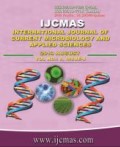


 National Academy of Agricultural Sciences (NAAS)
National Academy of Agricultural Sciences (NAAS)

|
PRINT ISSN : 2319-7692
Online ISSN : 2319-7706 Issues : 12 per year Publisher : Excellent Publishers Email : editorijcmas@gmail.com / submit@ijcmas.com Editor-in-chief: Dr.M.Prakash Index Copernicus ICV 2018: 95.39 NAAS RATING 2020: 5.38 |
Taro [Colocasia esculenta (L.) Schott] is one of the tropical tuber crops hailed as food security crop in tropics especially in developing nations. Tropical tuber crops are famously known for their withstanding capacity under harsh and marginal environments. But the severe reduction has been reported in taro biochemical, physiological parameters and corm yield under water deficit stress in spite of inherent drought tolerance capacity. Meager information is available pertaining to biochemical, physiological variations and tolerance mechanisms under water stress in taro. Full understanding of tolerance mechanisms under water stress in taro is key in developing highly stress-tolerant varieties with improved yield. Keeping this view, the effect of water deficit stress on variation in biochemical and physiological parameters was assessed in seven taro varieties/genotypes. Highly significant differences (P<0.001) were observed for all varieties/genotypes and parameters selected for the study. As a consequence of water deficit stress, all parameters (except proline content) were greater in varieties/genotypes grown under irrigated conditions as compared to varieties/genotypes grown under water deficit stress. As a defensive mechanism, proline content (Irrigated: 66.36-89.96 µg g-1; Water deficit stress: 200-358.33 µg g-1) was found to be augmented in the plants subjected to water deficit stress. Under water deficit stress, significantly higher chlorophyll a (1.23 mg g-1), chlorophyll b (0.37 mg g-1), total chlorophyll (1.60 mg g-1) and carotenoid content (0.31 mg g-1) were recorded in genotype Jankri, whereas, significantly higher protein (1.10 mg g-1) and proline content (358.33 mg g-1) was found in Sree Reshmi and Tamarakannan, respectively. Pertaining to physiological parameters, significantly higher relative water content (67.15%) was exhibited by Telia genotype, whereas, Sree Kiran variety was more drought-tolerant owing to higher chlorophyll stability index (53.67%) and membrane stability index (45.00%).
 |
 |
 |
 |
 |